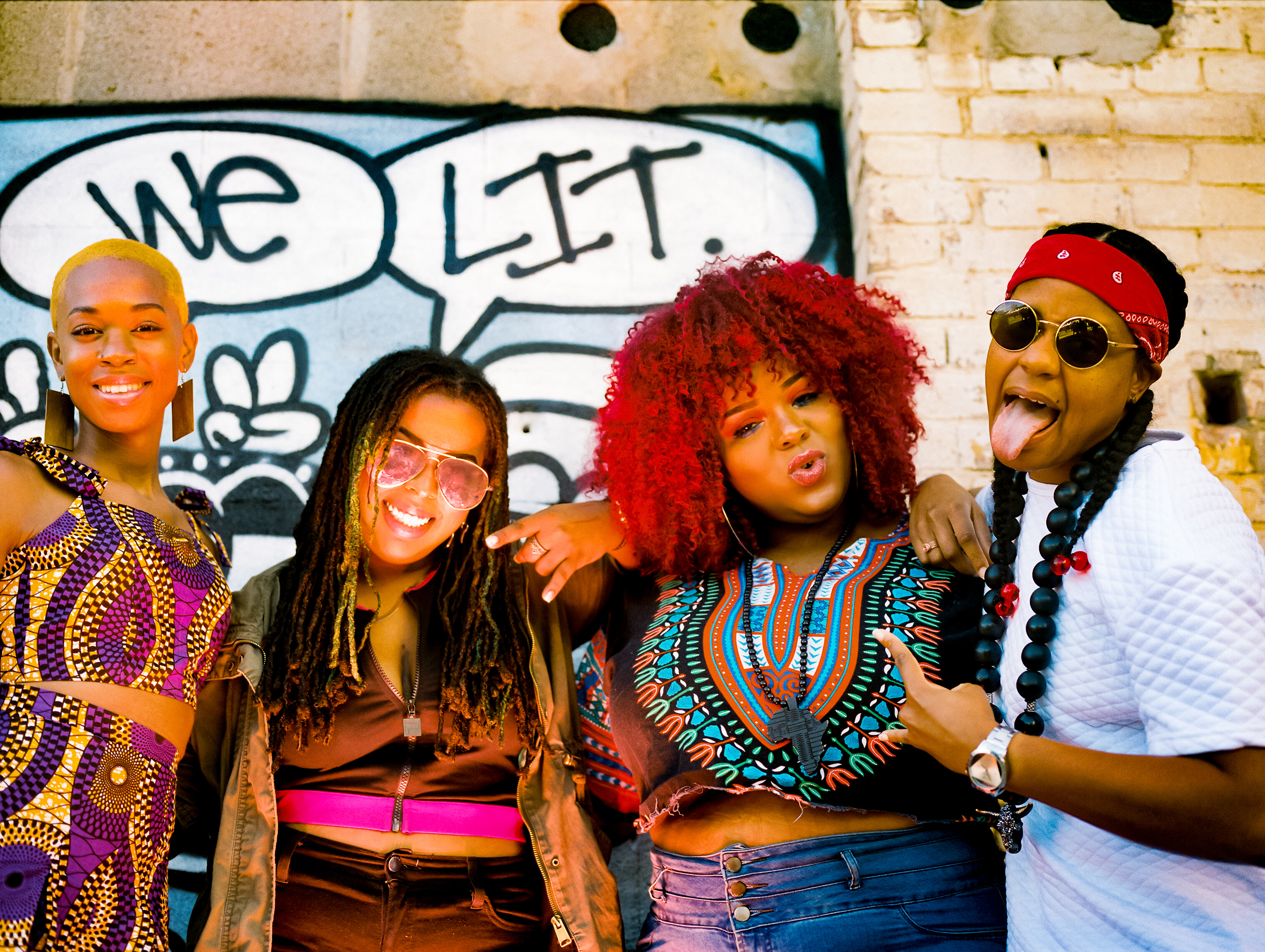In America’s current social and political climate, being socially conscious is a necessary weapon in a black woman’s arsenal in a world that is constantly at war with her. The Txlips is a group of black women who promote social awareness while making waves in the music scene.
“I feel like we’re at the brink of a new era,” says band member Dara Carter. “A peaceful era and accepting era and I think that groups like us, people, artists like us, we’re trailblazing that right now. So it’s really important that we do that and we are vocal about it, and that we are unapologetic in our delivery.”
The band is Atlanta-based, but their music resonates universally with black women, young and old, searching for a fearless expression of who they are. VOX ATL sat down with band members Dara Carter, Gabriella Logan, Joela Oliver and Mo Drumma (pictured in order above) to discuss issues black women face in the music industry, utilizing music as a platform for social justice and change, and the radical nature of unapologetic blackness.
VOX ATL: Would you mind sharing some of your musical influences that shape your sound?
Gabriella Logan: Nirvana, Steve Vai, definitely Beyonce, and Stealers Wheel. I know that’s weird, but I love Stealers Wheel, the songwriting is impeccable.
VOX ATL: Did you ever think you would be here now, performing in this space? What did you imagine? Did you know you wanted to be a part of making music?
Joela Oliver: I knew I was gonna make it, I knew I was gonna be a star. Ever since I was little, the first thing I said I wanted to be was an actress so I could perform with Jackie Chan. I loved him a lot when I was a kid. I knew I loved being on stage, I knew I loved performing, so I knew I was gonna be here one day.
Dara Carter: Same. My parents got me in music when I was young. I fell in love with it and ever since then, this has been the goal. This and much more obviously, but I’ve always known that I would be doing things like this, you know.
Mo Drumma: Same with me, my parents got me involved early, or I got myself involved and made my parents have no choice but to keep going with me growing up. But I always had a knack for just being in front of people, either making them laugh or doing something musically. So I was always doing something to gain an audience and whether it was acting or music or whatever, I knew it was gonna be one of these that I was gonna get involved in. Music is basically what it is, so I’ve been great with it ever since then.
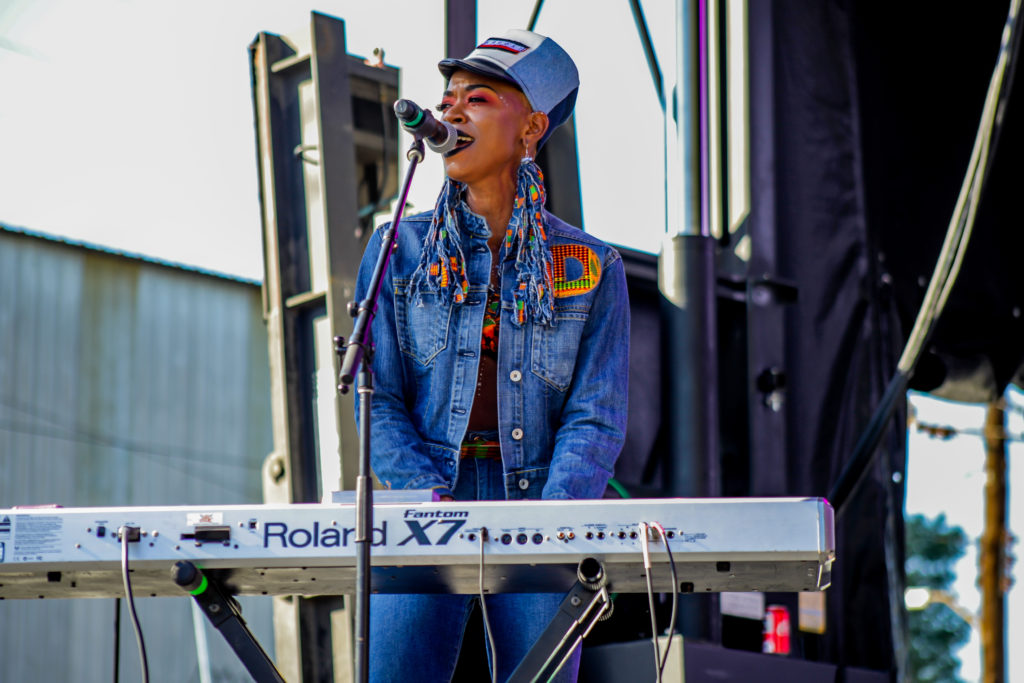
VOX ATL: What kind of message are you hoping to send with your music? What dialogue are you hoping to start?
Logan: Positivity and conversation about black people. I just want to start a conversation. Like we need to talk to each other through a different lens. We need to talk to each other through rap, through pop, and everything else.
Carter: Wakeup, be conscious, be aware.
Mo Drumma: Open that third eye, fourth eye, fifth eye, whatever. You got to wake yourself up to really be aware of everything, be aware of yourself. Persevere you, preserve the people.
VOX ATL: How do you feel like you’re representing the voices of women in the music industry, which is not so accepting?
Carter: I feel we’re getting women who didn’t know they had a voice the opportunity to have their own voice and saying to them “hey it’s okay to express yourself.” In any way, you need to. Maybe not in ways that maybe that you think is the acceptable way. The only acceptable way we’re showing them is like “no, you can express yourself however it is you need to express yourself.”
Mo Drumma: Show them they have options. A variety of options. So I mean, women, there are layers to us, many layers to us. So we’re creating a voice for the voiceless, or [people] who feel like they don’t have one and letting them know that okay, what you think is the only way is not, so open up that other layer to yourself. Just open yourself up. You will uncover your true being and be damn proud about it.
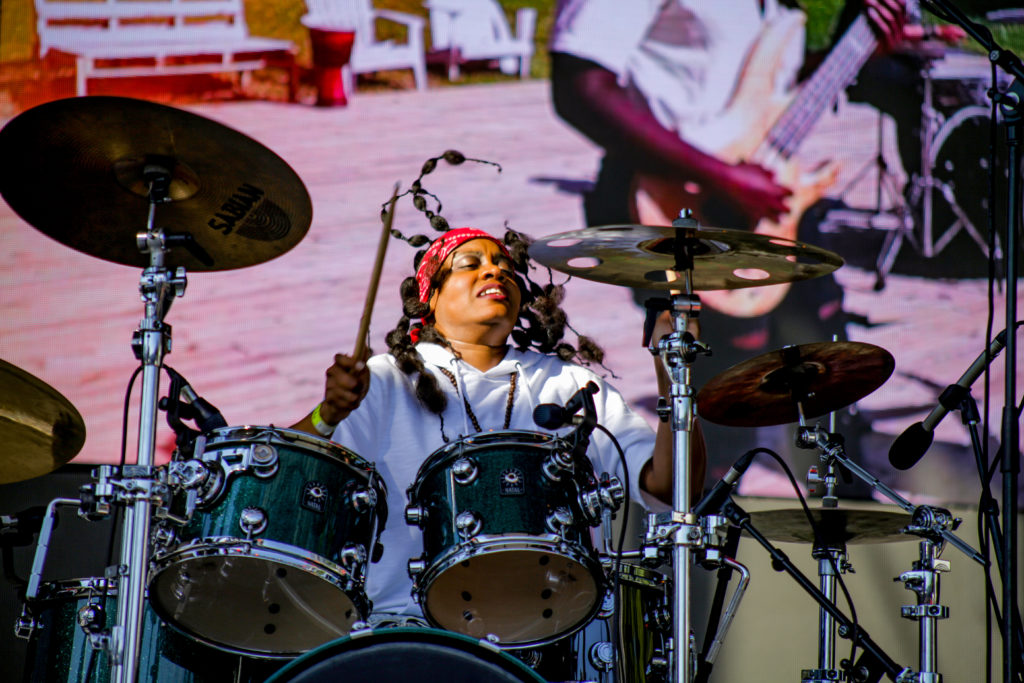
VOX ATL: How do you think you integrate empowerment and authenticity into your music?
Carter: By being raw, by speaking on things that we’ve gone through and being vulnerable. When people watch us perform or hear our music, I don’t want them to look at us as “oh, they’re these people who have these amazing lives and never go through anything,” which we continue to do with people that we idolize. I want people to know that these are human beings just like me, and if they can be vulnerable so can I.
Oliver: If this was around when I was younger and going through my rocker phase, this would probably be my favorite band, because yeah, she’s black, yeah, she had a scene phase, a dark phase, all black, and the fact that she talks about the things that she goes through. Like yes, I’m a black girl going through things, and people call me an Oreo [for it].
VOX ATL: How do you think black women taking back and reclaiming their power and their identity is radical in and of itself?
Logan: Because its black. Like that makes people nervous for some reason, even though we are the shit. Like when Black Lives Matter first started, everyone was like, “oh my God, this is just a random group, and no one’s doing anything.” We’re just trying to defend ourselves, same thing with the Black Panthers. We’re just standing up for our own stuff because it’s ours. And so I feel like that’s what we do through each of our individual energies. Again, back to black people [being] just so cohesive. Our culture is amazing, it’s so diverse, but it’s still cohesive and I feel like being black in and of itself and being a woman right there, those two already are like ”woah.”’And we all already know how to play the hell out of our instruments, and it’s rock and roll.
Mo Drumma: People tend to amplify the unnecessary to shadow and cover the reality of what’s going on. So like, back to like Black Lives Matter. All the things that she was saying and how we were combated with that or seen as just this monster of a collective, this monster of union attacking everybody, but no, that’s not why we’re here. So many people fail to understand the “why” behind what we’re doing. This is a nonviolent, real expression of who we are. Freedom of speech, that’s what we’re exercising. We’re staying within the rules that were created but we are manipulating it into benefiting us finally. So the fact that we’re black, the fact that we’re women, the fact that we’re owning everything that we’re doing and we are very vocal about it, it scares a lot of people, and we like it that way. Change is here, change is coming and they’re either going to have the rise and to occasion or go live on another planet or something.
VOX ATL: How do you integrate black and hip-hop culture into your music, and why it’s so significant?
Logan: You know how people will ask you, what do you listen to, but they assume you’re listening to something based on how you look? Most people assume that I listen to rock, which I do. I listen to a lot of rock, but I also listen to a lot of trap. We listen to a little bit of everything, and we each play from different styles.
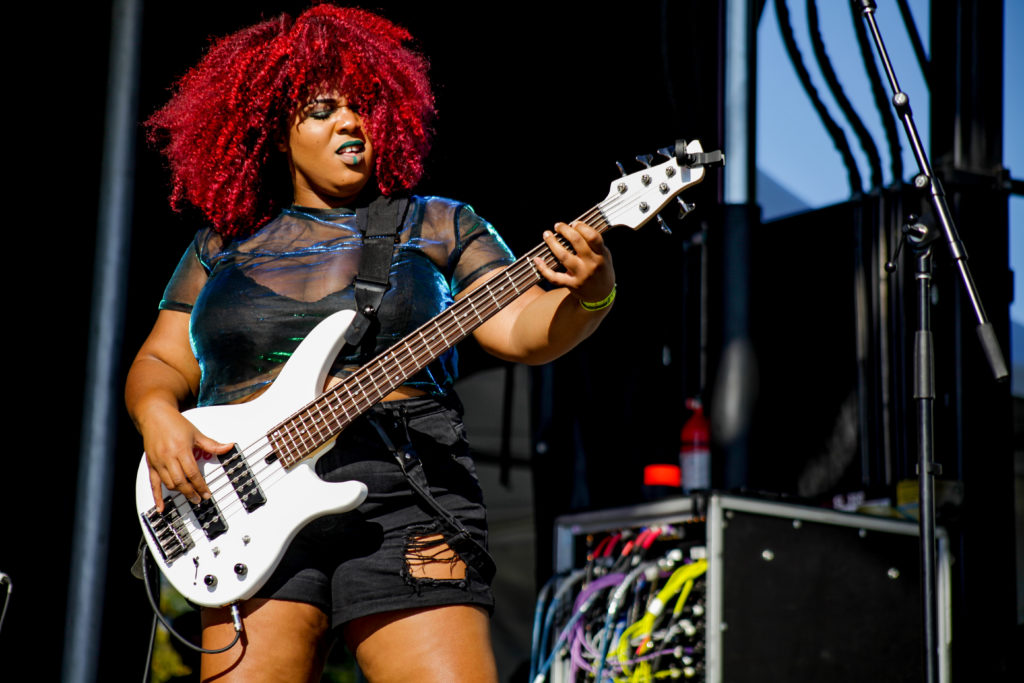
VOX ATL: Could you all describe to me the kind of energy and synergy you have together on stage?
Mo Drumma: I can’t define that. It just happens, it’s just there.
Oliver: Also, when you’re a professional, you’ve been doing this for a long time, you know how to just get on and do what you need to do.
Carter: [It’s like] someone can look at you, and you know exactly what they’re saying on stage. And I think also that sort of chemistry comes from how we are off stage with each other. Like we actually know we care about each other. We’re sisters. A lot of time we spend together. We respect each other. We got each other’s back. So when you’re on stage, that sort of energy is there. I’ve definitely played with bands I didn’t feel as comfortable with because that chemistry [is missing].
VOX ATL: What statement are you hoping to make to your fans, as well as to some of the people that refuse to listen to you because of what you stand for?
Logan: So, remember when we [Txlips band members] were at the Masquerade, and I said “p*ssy is power” on stage, and it was like dead silent? I said that on stage, and all the dudes are the crowd where like “I mean… well.. you know…” So I came back and said, “you don’t have to like it, but you will respect.” And we kept going through all the songs. And by the end of that, I think a lot of people had nothing but respect because I’m not asking you for your opinion. I’m telling you a fact.
Oliver: My statement would be, “be as happy as you can.” Not happy on anyone else’s terms, [but] on your terms. Do whatever it takes to make you happy. I want to reach out to people when they see me play. Even if you’re by yourself, you know. You can’t be any you-er than you. That’s by Dr. Seuss. That’s what I want people to know and understand.
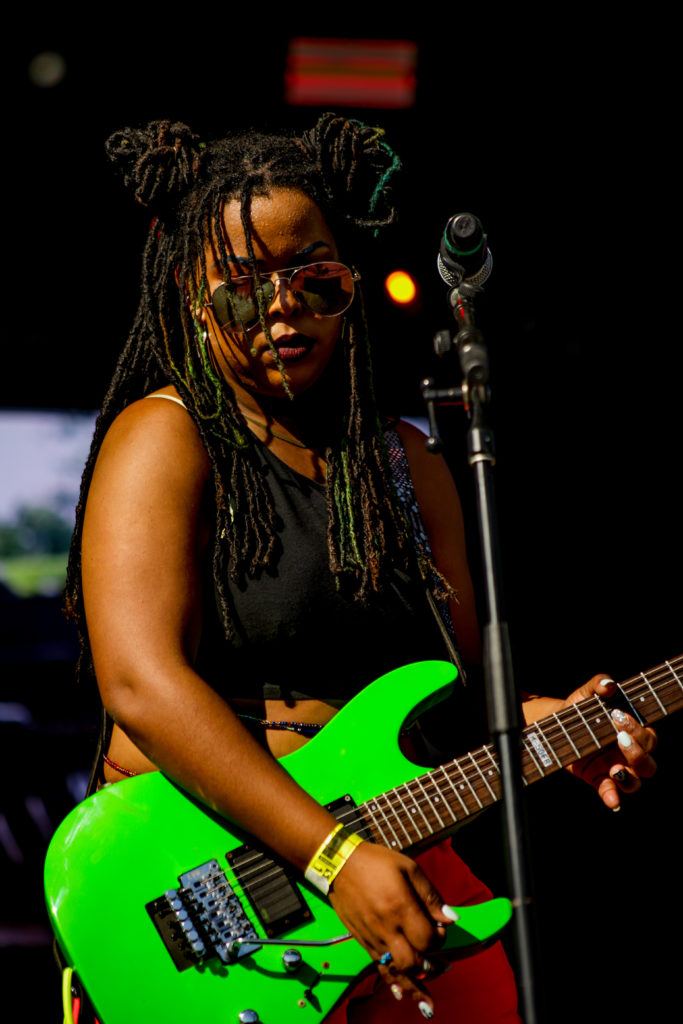
VOX ATL: What has it been like being a part of, and even helping to create a space in the music industry right now as black women?
Carter: A tough road. But for me personally, it took a lot of trial and error, being in bands with all men to get to the point of realizing like, my artistry, my art; I’m powerful by myself, I’m powerful on my own as a woman and as an artist. I don’t need other people’s opinions or permissions. It’s been a tough road with that, but I feel like I finally reached that understanding.
Logan: Yeah, I’ll definitely say it’s been a tough road– but persevere. And the passion and the drive for seeing black women in this space is extremely important to me. And so I keep going no matter what.
Oliver: Yes there will be trial and error, but I guess for me it wasn’t too tough because I didn’t play with people, period. It’s about knowing yourself and being confident in yourself.
Mo Drumma: I always just kept on pushing, pushing, pushing. If I don’t like something, it’s very obvious and I just keep pushing to find another path to get to my goal and just keep going to see that whatever was coming my way was a hindrance for that time. It’s just an obstacle to overcome and just keep going. So I never felt like I could be stopped, at all. I would just say, “just push.” Sometimes you need that fire lit under your ass, but if you believe in something enough, you got the passion for it, the dedication, support, and you really want to go somewhere, keep pushing for it. Go get it.
Erin Davis, 17, is a journalist and photographer dedicated to documenting the avant-garde and unconventional and strives to uplift the creative expression of marginalized communities and subcultures.

